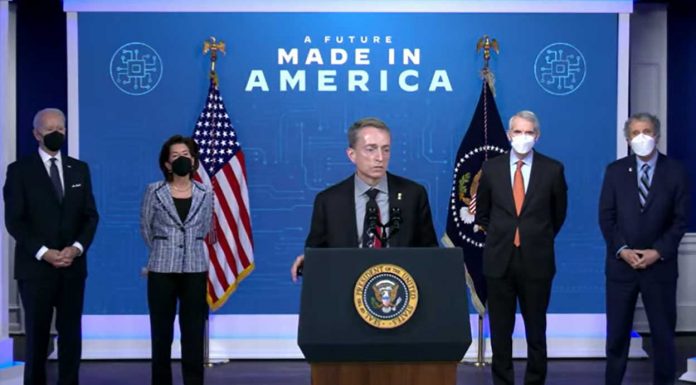Global chip maker Intel has announced to invest $20 billion to build a new factory in Ohio, an attempt to help alleviate a global shortage of chips powering everything from phones to cars to home appliances while also signalling the company's commitment to manufacturing crucial technology products in the US.
The move looks to create a new technology hub in central Ohio as related businesses that support chip manufacturing open new facilities and bring expertise to the region. According to Intel, two planned factories, or fabs, will support its own line of processors as well as its new “foundry” business, which will build chips designed by other firms. Existing chip foundries turn out a vast number of custom-designed chips, mostly in Asia.
The business is currently dominated by Taiwan Semiconductor Manufacturing Co. or TSMC. The future production site aims to meet multiple needs, Intel CEO Patrick Gelsinger said during a White House event. Chips built there won't just reduce supply chain pressures, he said, but will also bolster U.S. national security while bringing more tech jobs to the region.
The two factories on a 1,000-acre site in Licking County, just east of Columbus, are expected to create 3,000 company jobs and 7,000 construction jobs. The facility will support tens of thousands of additional jobs for suppliers and partners, Intel and local and state officials said Friday.
President Joe Biden used Intel's Ohio announcement to push a $52 billion bill awaiting House approval that would invest in the chip sector and help ensure more production occurs in the U.S. “We are going to invest in America,” Biden said at the White House.
“We're investing in American workers. We're going to stamp everything we can, ‘Made in America,' especially these computer chips.
”Construction is expected to begin this year, with production coming online at the end of 2025. The company is also investing an additional $100 million for an education pipeline to help provide jobs for the facility. Total investment could top $100 billion over the decade, with six additional factories, Gelsinger said.
Intel's Ohio site won't likely make it into cars — a priority for U.S. consumers and officials — but added that any big chip factory expansion could help relieve pressure on the company's other product lines. But making more computer chips in the U.S. won't entirely protect the industry from supply chain disruptions and shortages because the chips still will be sent to Asia for assembling and packaging, said Nina Turner, a research analyst at IDC.
After years of heavy reliance on Asia for the production of computer chips, vulnerability to shortages of the crucial components was exposed in the U.S. and Europe as they began to emerge economically from the pandemic. Shortages of chips have crimped the ability of U.S. automakers to produce vehicles and last year, General Motors was unseated by Toyota as the nation's top-selling automaker for the first time.
The US and Europe are pushing aggressively to build chip-making capacity and reduce reliance on producers that are now mostly based in Asia. Semiconductor businesses have also been trying to diversify their operations to avoid bottlenecks caused by problems — such as a natural disaster or pandemic lockdown — in a specific region.
Several chipmakers last year signalled an interest in expanding their American operations if the U.S. government is able to make it easier to build chip plants. Samsung said in November it plans to build a $17 billion factory outside of Austin, Texas. The Intel project is the largest single private-sector investment in Ohio's history, on par with an agreement in 1977 that brought Honda to central Ohio, where it now employs more than 14,000 people.
Intel is the No. 2 semiconductor manufacturer globally, with $73.1 billion in revenue last year, behind South Korean world leader Samsung Electronics with $76 billion, according to market analysis from Gartner Inc.







